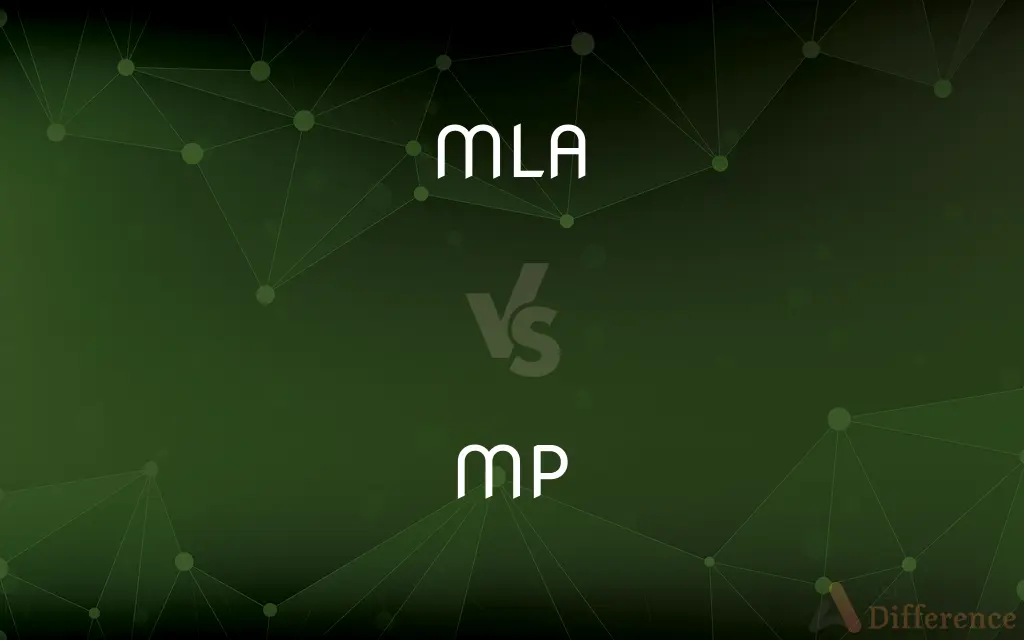MLA vs. MP — What's the Difference?
By Tayyaba Rehman — Published on December 14, 2023
MLA stands for "Member of the Legislative Assembly," representing constituents in a state/provincial legislature; MP stands for "Member of Parliament," representing constituents in a national parliament.

Difference Between MLA and MP
Table of Contents
ADVERTISEMENT
Key Differences
Both MLA and MP are elected representatives, but they operate at different levels of government. While an MLA is elected to a state or provincial legislative assembly, an MP is elected to the national parliament. These titles denote the different spheres of influence and jurisdiction each position holds.
MLAs primarily focus on state or provincial matters, encompassing areas such as education, health, and local infrastructure within their respective regions. Conversely, MPs deal with national and international issues, crafting and voting on policies that have nationwide implications.
When citizens vote for an MLA, they're choosing a representative to address local or regional concerns in the legislative assembly. In contrast, when electing an MP, voters are selecting a representative to handle broader national issues in the parliament.
In many countries, the legislative assembly where MLAs serve is often a unicameral body, meaning it has one house. Parliaments, where MPs serve, might be bicameral, with two houses, such as an upper and a lower house. This distinction further differentiates the roles and responsibilities of an MLA from an MP.
In terms of visibility, MPs often gain more national attention because of their involvement in decisions that affect an entire country. MLAs, on the other hand, might be more recognizable at the local or state level, given their closer ties to community-specific issues.
ADVERTISEMENT
Comparison Chart
Full Form
Member of the Legislative Assembly
Member of Parliament
Level of Government
State/Provincial
National
Main Focus
Regional issues and policies
National and international issues and policies
Representation
Constituents in a state/province
Constituents nationally
Typical Legislative Body
Often unicameral
Often bicameral
Compare with Definitions
MLA
A member chosen by voters to address regional concerns in a legislative body.
Our local MLA sponsored a bill to improve public transportation.
MP
An elected representative in a country's national parliament.
The MP for our area is advocating for healthcare reforms.
MLA
An individual representing a specific constituency in a state or provincial legislature.
The newly elected MLA held a town hall meeting to hear community concerns.
MP
A member chosen by citizens to address national issues in parliament.
The local MP introduced a bill on cybersecurity.
MLA
A state-level politician responsible for crafting and voting on regional policies.
The MLA championed environmental conservation in the assembly.
MP
A federal-level politician responsible for crafting and voting on national legislation.
The MP is part of a committee focusing on foreign trade agreements.
MLA
An elected representative in a state or provincial legislative assembly.
The MLA from our district pushed for better local schools.
MP
An individual representing a specific constituency at the national legislative level.
Young activists met with their MP to discuss climate change policies.
MLA
A regional legislative figure who voices local issues and concerns.
Residents met with their MLA to discuss the rising property taxes.
MP
A national legislative figure who voices broader societal concerns.
An MP held a press conference about the country's defense budget.
MP
A military police officer.
MP
Init of market price– written on menus instead of a price to mean the price charged depends on the price of supplies, which may vary.
Ribeye steak – $20; Pork chop – $15; Lobster – mp
MP
A member of the military police who polices soldiers and guards prisoners
MP
A military corps that enforces discipline and guards prisoners
Common Curiosities
Who deals more with state or provincial issues?
The MLA.
Where do MPs primarily operate?
MPs operate in the national parliament.
Who might be part of debates on national budget allocations?
The MP.
Who might handle matters like defense and foreign affairs?
The MP.
Is an MLA's role similar across countries?
While the general idea is similar, the specific powers and responsibilities can vary by country.
How often are MLAs and MPs elected?
It varies by country and specific positions, but both have set terms of office.
What does MLA stand for?
MLA stands for "Member of the Legislative Assembly."
Can someone be both an MLA and an MP?
Typically, no, as they serve different legislative bodies.
Who represents citizens' concerns about local infrastructure?
The MLA.
Whom should I approach regarding national tax reforms?
The MP.
Is an MLA's jurisdiction limited to their specific state or province?
Yes, MLAs focus on their particular state or provincial region.
Are MPs' decisions generally impactful on a national scale?
Yes, MPs make decisions that affect the entire country.
Can an MLA influence national defense policies?
Typically, no, as that's the purview of MPs.
Who addresses educational policies in a state or province?
The MLA.
In which legislative body would an MP's bill be introduced?
In the national parliament.
Share Your Discovery

Previous Comparison
Qualitative Data vs. Quantitative Data
Next Comparison
Collaborative Learning vs. Cooperative LearningAuthor Spotlight
Written by
Tayyaba RehmanTayyaba Rehman is a distinguished writer, currently serving as a primary contributor to askdifference.com. As a researcher in semantics and etymology, Tayyaba's passion for the complexity of languages and their distinctions has found a perfect home on the platform. Tayyaba delves into the intricacies of language, distinguishing between commonly confused words and phrases, thereby providing clarity for readers worldwide.
















































